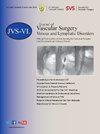机械化学消融术后的静脉直径、肥胖程度和再通率。
IF 2.8
2区 医学
Q2 PERIPHERAL VASCULAR DISEASE
Journal of vascular surgery. Venous and lymphatic disorders
Pub Date : 2024-06-28
DOI:10.1016/j.jvsv.2024.101935
引用次数: 0
摘要
导言:和目标:静脉直径大与大隐静脉和小隐静脉静脉腔内热消融术后较高的再通率有关。然而,探讨静脉直径与机械化学消融术(MOCA)后再通率之间关系的研究相对较少:我们对 2017-2021 年在一家医院接受大隐静脉或小隐静脉机械化学消融术的慢性静脉功能不全患者进行了回顾性研究。未进行后续超声检查的患者被排除在外。患者被分为大(≥ 1 厘米)或小(< 1 厘米)治疗静脉。主要结果是治疗段的2年再通畅率和再介入率:结果:研究期间共分析了186例MOCA手术。各组患者的年龄、性别、静脉血栓栓塞病史、抗凝药物使用情况、肥胖程度或治疗段长度均无差异。与小静脉患者相比,大静脉患者发生瘀血溃疡的几率较低(3.2% vs 21.5%;P结论:静脉直径大与大隐静脉和小隐静脉MOCA术后较高的再通率无关。不过,肥胖与再通率有关。本文章由计算机程序翻译,如有差异,请以英文原文为准。
Vein diameter, obesity, and rates of recanalization after mechanochemical ablation
Objective
A large vein diameter is associated with higher recanalization rates after endovenous thermal ablation procedures of the great saphenous vein (GSV) and small saphenous vein (SSV). However, relatively few studies have explored the relationship between vein diameter and recanalization rates after mechanochemical ablation (MOCA).
Methods
We conducted a retrospective review of patients with chronic venous insufficiency who underwent MOCA of the GSV or SSV from 2017 to 2021 at a single hospital. Patients with no follow-up ultrasound examination were excluded. Patients were classified as having a large (≥1 cm) or small (<1 cm) treated vein. The primary outcomes were 2-year recanalization and reintervention of the treated segment.
Results
A total of 186 MOCA procedures during the study period were analyzed. There was no differences in age, gender, history of venous thromboembolic events, use of anticoagulation, obesity, or length of treated segment between the cohorts. Patients with large veins were less likely to have stasis ulcers compared with those with small veins (3.2% vs 21.5%; P < .05 on Fisher exact test). Patients with large veins had a higher incidence of postoperative local complications (24.2% vs 7.2%, P < .05 on χ2 test). A survival analysis with Cox proportional hazards showed no significant difference in recanalization rates with larger vein diameters. However, obesity was found to correlate significantly with recanalization.
Conclusions
A large vein diameter was not associated with higher recanalization rates after MOCA of the GSVs and SSVs. However, obesity was found to correlate with recanalization rates.
求助全文
通过发布文献求助,成功后即可免费获取论文全文。
去求助
来源期刊

Journal of vascular surgery. Venous and lymphatic disorders
SURGERYPERIPHERAL VASCULAR DISEASE&n-PERIPHERAL VASCULAR DISEASE
CiteScore
6.30
自引率
18.80%
发文量
328
审稿时长
71 days
期刊介绍:
Journal of Vascular Surgery: Venous and Lymphatic Disorders is one of a series of specialist journals launched by the Journal of Vascular Surgery. It aims to be the premier international Journal of medical, endovascular and surgical management of venous and lymphatic disorders. It publishes high quality clinical, research, case reports, techniques, and practice manuscripts related to all aspects of venous and lymphatic disorders, including malformations and wound care, with an emphasis on the practicing clinician. The journal seeks to provide novel and timely information to vascular surgeons, interventionalists, phlebologists, wound care specialists, and allied health professionals who treat patients presenting with vascular and lymphatic disorders. As the official publication of The Society for Vascular Surgery and the American Venous Forum, the Journal will publish, after peer review, selected papers presented at the annual meeting of these organizations and affiliated vascular societies, as well as original articles from members and non-members.
 求助内容:
求助内容: 应助结果提醒方式:
应助结果提醒方式:


